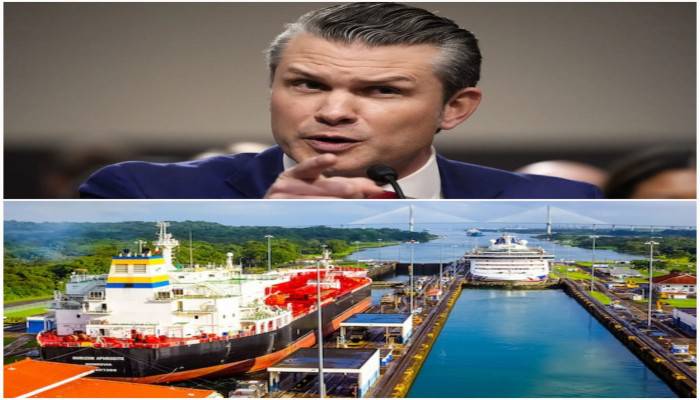US to reclaim Panama Canal control to end China’s influence: Defense Secretary Pete Hegseth
- In Reports
- 12:58 PM, Apr 09, 2025
- Myind Staff
U.S. Secretary of Defense Pete Hegseth announced today that the United States will reclaim control of the Panama Canal, aiming to end China’s growing influence over one of the world’s key shipping routes. His statement came during a rare visit to Panama, marking the first time in decades that a U.S. defence secretary has travelled to the Central American country.
Hegseth privately met with Panamanian President Jose Raul Mulino during the visit and toured the canal firsthand. The trip underscored Washington’s ongoing concerns about China’s investments and presence in the area surrounding the canal, which links the Atlantic and Pacific Oceans. After meeting with Panama’s leadership, Hegseth pledged to strengthen U.S. military cooperation with Panama’s security forces. He also stated that China would not be allowed to use its commercial ties through Chinese companies as a cover for espionage or military influence over the canal.
While speaking in Panama City, Secretary Hegseth declared, "Together, we (Panama and the US) will take back the Panama Canal from China's influence." With Donald Trump’s firm stance on the issue, Secretary Hegseth’s visit carried significant weight.
He indicated that a new agreement with Panama, the first since 1999, would effectively eliminate China’s role in the canal. Emphasising this point, he said, "China did not build this canal. China does not operate this canal, and China will not weaponise this canal. With Panama in the lead, we will keep the canal secure and available for all nations." Hegseth also commended President Mulino, saying his administration recognised "the threat from China." His comments about Panama taking the "lead" in safeguarding the canal seemed to show respect for Panama's position.
While Secretary Hegseth focused on reducing China’s presence in Panama, President Trump took a broader stance and hasn’t ruled out the possibility of using military force if needed. Even before Hegseth arrived in Panama, reports suggested that the Trump administration had already asked the U.S. military to explore ways to secure access to the Panama Canal. The canal, originally built by the United States over a century ago, was entirely handed over to Panama in 1999. However, recent developments suggest a shift in that arrangement, with the U.S. military now expected to begin regular patrols and operations in coordination with Panamanian security forces.
According to Reuters, several existing and former U.S. officials and strategic experts believe the United States has found a cooperative ally in Panamanian President Jose Raul Mulino to counter growing Chinese influence in the region.
In February, President Mulino announced that Panama would formally withdraw from China’s Belt and Road Initiative. He has also supported Donald Trump’s efforts to curb illegal immigration in the U.S. by agreeing to accept deportation flights carrying non-Panamanian migrants and taking steps to limit the flow of people crossing through Panama’s dangerous Darien jungle from South America.
In a major development last month, U.S. investment firm BlackRock led a deal to acquire most of the $22.8 billion ports business owned by Hong Kong-based CK Hutchison, which includes ports located at both ends of the Panama Canal. President Trump praised the move, calling it an example of the U.S. “reclaiming the Panama Canal.”
China, however, strongly criticised the deal. Its market regulator announced plans to launch an antitrust investigation into the acquisition.
Military analysts have highlighted the strategic importance of the Panama Canal in the event of a conflict in Asia. The canal allows U.S. naval ships to move between the Atlantic and Pacific Oceans, vital for wartime operations. Experts warned that China’s significant presence near the canal could disrupt ship movements. Even if China can’t physically block U.S. naval vessels, it would still gain a strategic edge by being able to monitor their passage through the canal.







Comments